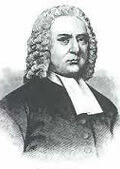the Third Week after Easter
Click to donate today!
Bible Commentaries
Gill's Exposition of the Whole Bible Gill's Exposition
Old Testament
New Testament
John Gill (1697-1771) stands as a monumental figure in the annals of theological scholarship and Baptist thought. Born in Kettering, Northamptonshire, England, Gill's intellectual journey began at an early age, marked by an insatiable appetite for knowledge and a particular affinity for Hebrew, which he taught himself. His contributions to Christian theology, biblical exegesis, and pastoral ministry left an indelible mark that continues to influence theological discussions and studies.
Gill's erudition was not confined to the pulpit or the ecclesiastical sphere; he was a prolific writer, best known for his monumental works, "The Exposition of the Old and New Testaments" and "A Body of Doctrinal Divinity." These works encapsulate Gill's Reformed Baptist perspective, meticulously presenting a comprehensive exposition of the Bible and laying out systematic theology with precision and depth. His commentary on the Bible is distinguished by its detailed analysis, drawing on Gill's extensive knowledge of Hebrew and Greek to delve into the linguistic nuances of the text.
A staunch defender of the doctrines of grace, Gill's theological stance was deeply rooted in Calvinist soteriology, emphasizing God's sovereignty in salvation. Yet, his legacy is also characterized by his commitment to religious liberty and his defense of the believer's baptism. Gill's pastorate at the Strict Baptist church in London for over half a century was marked by fervent preaching, scholarly pastoral care, and a deep love for his congregation.
John Gill's legacy is a testament to his enduring impact on theological scholarship and the Baptist tradition. His works continue to offer rich insights into biblical texts, serving as a valuable resource for theologians, pastors, and believers seeking a deeper understanding of the Christian faith. Gill's life and writings exemplify a profound commitment to God's Word, rigorous intellectual inquiry, and the pastoral heart, making him a towering figure in Christian history.
